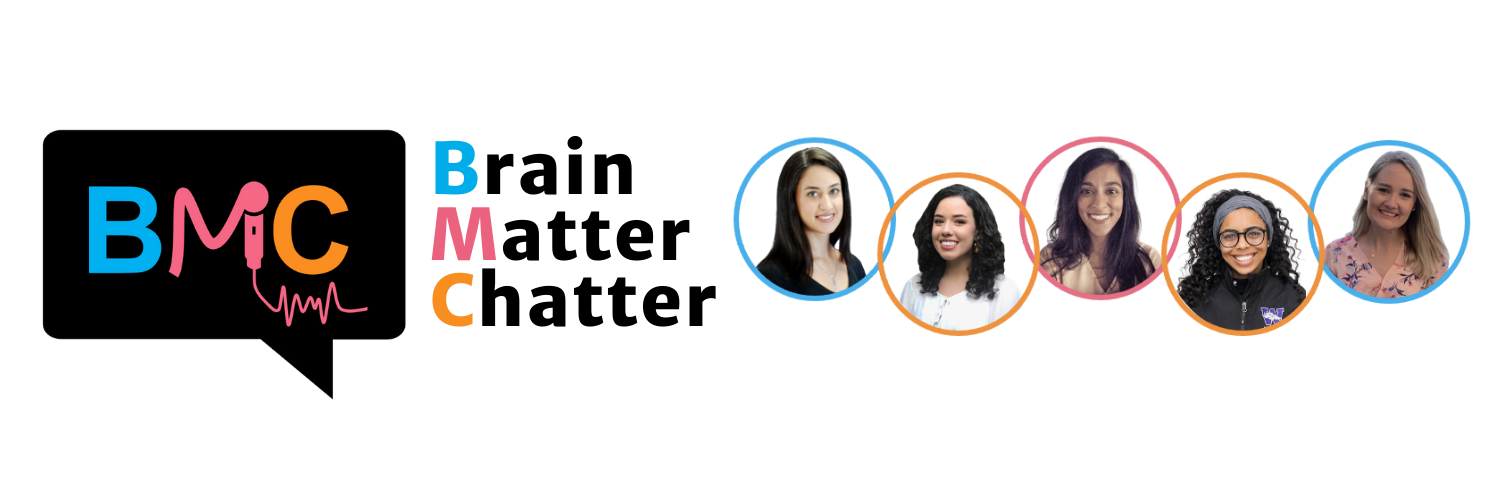
Episodes
NOW STREAMING on:
About Us
Neuroscience grad students addressing academic mental health by sharing student stories, faculty perspectives, and expert advice
Welcome to Brain Matter Chatter (BMC), the #AcademicMentalHealth podcast. Our mission is to raise awareness about issues surrounding mental health in academia. As graduate students, at various stages, studying neuroscience, our hosts bring a unique experiential and scientific perspective to discussions on mental health and illness. To provide a holistic picture of mental health in academia, we aim to bring a diverse set of guests to BMC. Some of our episodes will serve to highlight the experiences of current graduate students. Others will invoke perspectives from our very own faculty advisors, mental health experts, and special guests who will add professional insights to the discussions.
Conversations surrounding mental health can be difficult. With this podcast, we hope to make the conversations easier and more accessible. A podcast platform is personal, on-demand, and varies in degree of engagement; listeners can choose when and where they listen, suggest topics that they want to hear discussed, and even appear on episodes as guests.
One episode at a time, we hope to begin planting the seeds for change. There isn’t a single, simple solution to the on-going state of mental health in academia. Cultivating a platform for open conversations about #AcademicMentalHealth is the first step.
BMC Origin Story
Unhealthy work-life balance is a major contributor depression and anxiety in graduate students, globally.
Nearly a year into the pandemic, the Society of Neuroscience Graduate Students (SONGS) IWIK committee organized a panel discussion on dealing with mental health concerns in graduate school. The panel received an overwhelmingly positive response from students across disciplines. Surprised by its success at the time, I wondered whether the pandemic was the culprit. Are graduate students experiencing a surge in mental health concerns due to social isolation, a change in routine, and uncertainty brought on by COVID-19 restrictions? I didn’t have to look too far to find that the short answer is “yes.” But, that’s not the end of the story, or rather, the start of it.
Several institutions have raised concerns about a “mental health crisis” in graduate education. A 2018 survey of 2,279 graduate students (90% PhD students and 10% Master's students) from 26 countries and 234 institutions found that 41% of grad students had moderate to severe symptoms of anxiety and 39% had moderate to severe symptoms of depression. These data, you’ll notice, were collected prior to the pandemic. Major contributors to poor mental health amongst trainees included work-life balance and supervisor–trainee relationships.
The results of the survey left me feeling concerned and confused. Concerned for my peers who are suffering in silence. Confused as to why graduate students aren’t made aware of the issues surrounding mental health in academia and provided with resources when these issues arise. To me, this is akin to not providing an Olympic gymnast with preparatory measures to avoid injury and access to a medical professional upon injury—a scenario completely unheard of. For graduate students, the knowledge that you’re not alone in your struggle, and resources to care and treatment are potentially life-altering measures that institutions should provide.
Enter: Brain Matter Chatter, the #AcademicMentalHealth podcast! With each story we share, and each topic we explore, we get one step closer to seeing change in our academic community. Highlighting the personal experiences of our graduate students will help foster a sense of normalcy in discussing mental health. Exploring biological factors contributing to a variety of mental health concerns, from Zoom fatigue to clinical depression, will help listeners better understand their condition. If BMC helped you in some way, as you struggled to navigate the complexity of research, coursework, writing grants, or teaching courses, then Olivia, Julia, Hayley, Niveen, and I will rest our heads knowing we’ve made a difference.
- Rubina Malik, BMC Founder

How you can get involved
“Stories have the power to create social change and inspire community” – Terry Tempest Williams
Your story is invaluable to the academic community. If you’d like to be on an episode of BMC to share your experience with mental health or illness, please let us know in the form below. You can also anonymously contribute your story, or suggest a topic, using the form below (by submitting without your name or email address).
We are always looking for accessible mental health resources to share with our listeners. You can help us out by letting us know of any local or online resources available.
Lastly, BMC’s livelihood depends on our listeners. You can support us by subscribing to BMC on your preferred method of podcasting (Spotify, Apple, etc.). Follow us on Twitter & Instagram (@brainmatterchat) to get notified when we release new episodes, to gain access to mental health resources, and to join a larger network of academics passionate about mental health.
We want to hear from our listeners!
Use this form to tell us your story, leave a comment, or suggest a topic. All submissions are anonymous unless you choose to leave your name and email address. If you wish to appear as a guest on the podcast, please include your name, email address, and topic you’d like to discuss.
Brain Matter Chatter is generously supported by: SOGS, SGPS, Student Experience, and BrainsCAN at Western





